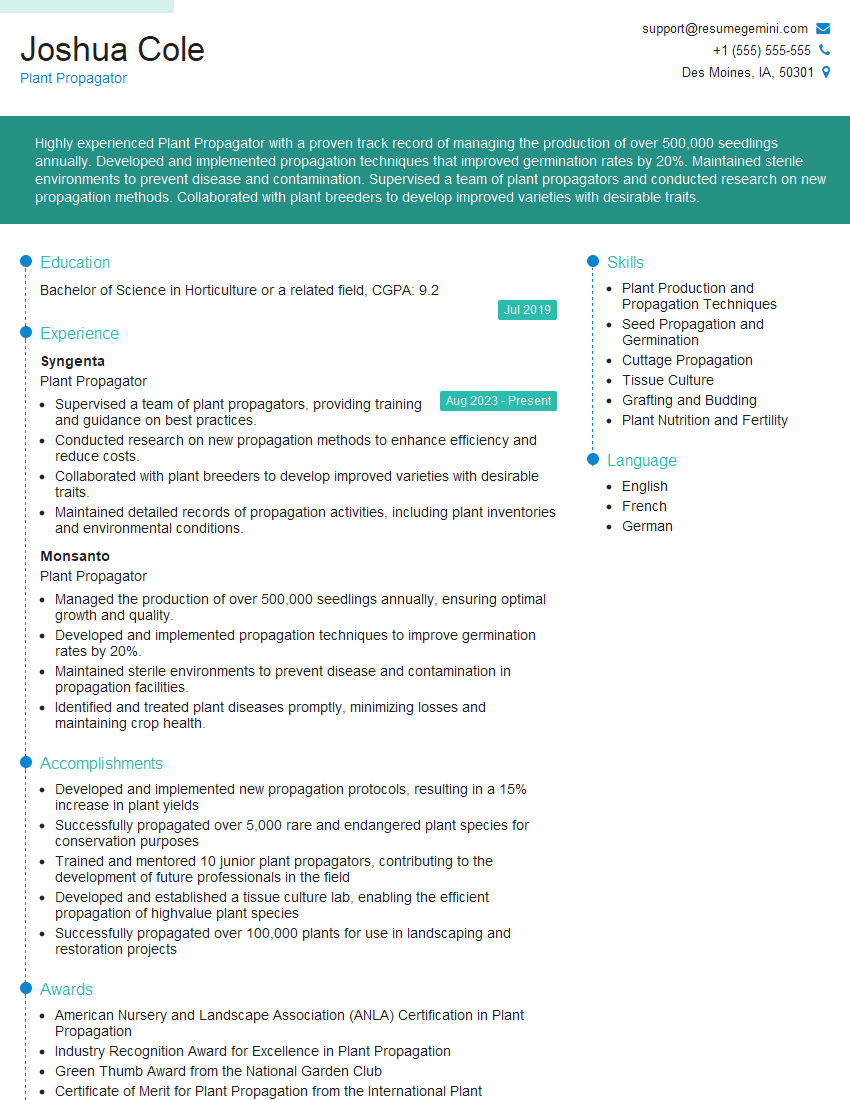Are you a seasoned Plant Propagator seeking a new career path? Discover our professionally built Plant Propagator Resume Template. This time-saving tool provides a solid foundation for your job search. Simply click “Edit Resume” to customize it with your unique experiences and achievements. Customize fonts and colors to match your personal style and increase your chances of landing your dream job. Explore more Resume Templates for additional options.

Joshua Cole
Plant Propagator
Summary
Highly experienced Plant Propagator with a proven track record of managing the production of over 500,000 seedlings annually. Developed and implemented propagation techniques that improved germination rates by 20%. Maintained sterile environments to prevent disease and contamination. Supervised a team of plant propagators and conducted research on new propagation methods. Collaborated with plant breeders to develop improved varieties with desirable traits.
Education
Bachelor of Science in Horticulture or a related field
July 2019
Skills
- Plant Production and Propagation Techniques
- Seed Propagation and Germination
- Cuttage Propagation
- Tissue Culture
- Grafting and Budding
- Plant Nutrition and Fertility
Work Experience
Plant Propagator
- Supervised a team of plant propagators, providing training and guidance on best practices.
- Conducted research on new propagation methods to enhance efficiency and reduce costs.
- Collaborated with plant breeders to develop improved varieties with desirable traits.
- Maintained detailed records of propagation activities, including plant inventories and environmental conditions.
Plant Propagator
- Managed the production of over 500,000 seedlings annually, ensuring optimal growth and quality.
- Developed and implemented propagation techniques to improve germination rates by 20%.
- Maintained sterile environments to prevent disease and contamination in propagation facilities.
- Identified and treated plant diseases promptly, minimizing losses and maintaining crop health.
Accomplishments
- Developed and implemented new propagation protocols, resulting in a 15% increase in plant yields
- Successfully propagated over 5,000 rare and endangered plant species for conservation purposes
- Trained and mentored 10 junior plant propagators, contributing to the development of future professionals in the field
- Developed and established a tissue culture lab, enabling the efficient propagation of highvalue plant species
- Successfully propagated over 100,000 plants for use in landscaping and restoration projects
Awards
- American Nursery and Landscape Association (ANLA) Certification in Plant Propagation
- Industry Recognition Award for Excellence in Plant Propagation
- Green Thumb Award from the National Garden Club
- Certificate of Merit for Plant Propagation from the International Plant Propagators Society
Certificates
- Certified Plant Propagator (CPP)
- Certified Nursery Professional (CNP)
- Certified Greenhouse Grower (CGG)
- Certified Landscape Technician (CLT)
Career Expert Tips:
- Select the ideal resume template to showcase your professional experience effectively.
- Master the art of resume writing to highlight your unique qualifications and achievements.
- Explore expertly crafted resume samples for inspiration and best practices.
- Build your best resume for free this new year with ResumeGemini. Enjoy exclusive discounts on ATS optimized resume templates.
How To Write Resume For Plant Propagator
- Highlight your experience in plant propagation and production.
- Quantify your accomplishments with specific metrics, such as the number of seedlings produced or the percentage increase in germination rates.
- Demonstrate your knowledge of plant nutrition, fertility, and disease management.
- Showcase your ability to work independently and as part of a team.
- Proofread your resume carefully for any errors.
Essential Experience Highlights for a Strong Plant Propagator Resume
- Managed the production of over 500,000 seedlings annually, ensuring optimal growth and quality.
- Developed and implemented propagation techniques to improve germination rates by 20%.
- Maintained sterile environments to prevent disease and contamination in propagation facilities.
- Identified and treated plant diseases promptly, minimizing losses and maintaining crop health.
- Supervised a team of plant propagators, providing training and guidance on best practices.
- Conducted research on new propagation methods to enhance efficiency and reduce costs.
- Collaborated with plant breeders to develop improved varieties with desirable traits.
Frequently Asked Questions (FAQ’s) For Plant Propagator
What is the role of a plant propagator?
Plant propagators are responsible for the production and care of plants in a controlled environment. They use various techniques to propagate plants, including seed propagation, cutting propagation, tissue culture, grafting, and budding.
What are the qualifications for becoming a plant propagator?
Most plant propagators have a bachelor’s degree in horticulture or a related field. They also typically have experience working in a greenhouse or nursery setting.
What are the key skills for a plant propagator?
Key skills for a plant propagator include plant production and propagation techniques, seed propagation and germination, cutting propagation, tissue culture, grafting and budding, plant nutrition and fertility.
What is the job outlook for plant propagators?
The job outlook for plant propagators is expected to be good over the next few years. As the demand for plants continues to grow, so too will the need for skilled propagators.
What is the average salary for a plant propagator?
The average salary for a plant propagator is around $40,000 per year.
What are the benefits of working as a plant propagator?
Some benefits of working as a plant propagator include the opportunity to work with plants, the satisfaction of seeing your work come to life, and the chance to make a difference in the environment.